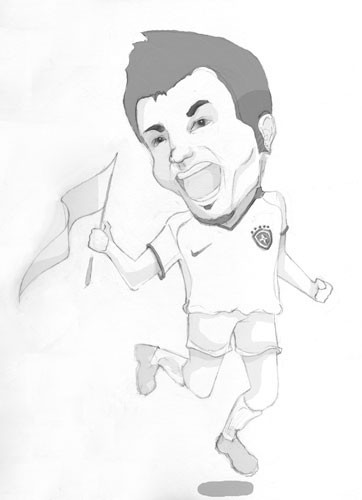Why the beautiful game is so beautiful
A ranty love letter to the sport that unifies the world
Whether you call it “football,” “futbol,” “futebol,” “calcio” or “soccer” (yuck!), frankly, it doesn’t matter - the game is far more important than the semantics. You should indeed pay attention and respect to “the beautiful game.”
After all, soccer (see, I will even be diplomatic and use your redneck nickname for the sport) is the world’s most popular game.
Currently, the world has been focusing its attention on South Africa, where the 19th FIFA World Cup Finals are being held. The tournament has been a tremendous success so far, and the games keep getting more and more exciting. Certainly, this World Cup has proven that soccer is a global phenomenon that transcends the game itself (a bold statement, I know!).
But, before we get into the World Cup, let’s analyze soccer itself. “What makes it so special?” you, the fashionable Bombers fan holding the 7/11 Big Gulp cup, might ask.
Well, take that expression “the beautiful game,” for instance. Why “beautiful”? Personally, I see beauty as something magical. There is something captivating, almost delightfully absurd, about trying to do with your feet what you can only do with your hands.
Think about it! Doesn’t that sound utterly stupid? No hands: feet! And that is why soccer is such a brilliant game. It’s unique. It requires very little to be played, but it does require a lot of brain and muscle for it to be played well. And, when it is played well, it is magical and truly beautiful.
Soccer is also a rebel sport. The referees don’t use video replays, and the game clock never stops. Incidentally, that is one of the arguments as to why soccer “never made it” in North America: without a stop-start system, networks can’t break for commercials.
The game flows like jazz, and what will happen is unpredictable. Therefore, contrary to popular belief, soccer isn’t a “sissy game,” but a game with a pair of raging big cojones. Players must finish what they started, and they must also deal with the grey morality of the game.
“ FIFA, soccer’s governing body, gives more international voice to countries than global politics does. Undoubtedly, the World Cup is about that beautiful idea of a harmonious global village.
The game flows like jazz, and what will happen is unpredictable. Therefore, contrary to popular belief, soccer isn’t a “sissy game,” but a game with a pair of raging big cojones. Players must finish what they started, and they must also deal with the grey morality of the game.
After all, when you have one human being making all the calls without the use of video replay, he is bound to make mistakes. Ah, shush, Bombers fan! It’s not about “being fair.” This is not a morality lesson. You cannot tame magic.
And, pardon my cliché, it’s all part of the game.
However, more importantly, soccer has become the best sportive reflection of a globalized world. Therefore - and you will have to pardon the cliché once again - soccer is about a lot more than just soccer.
Which brings me to the World Cup, the largest event in the world. Yes, larger than the Olympics; even larger than the entire collection of drunken Lindsay Lohan photographs floating around the Web.
Just to put things in perspective, 204 nations (Canada included) played over a period of four years and tried to qualify for the 32 spots in the finals. That is 12 more nations than the whole of the United Nations (192).
That means that FIFA, soccer’s governing body, gives more international voice to countries than global politics!
Undoubtedly, the World Cup is about that beautiful idea of a harmonious global village. It began as a small event in Uruguay in 1930 and it has now become the largest cultural gathering on the planet.
Furthermore, the political elements of the tournament are fascinating. It was in a 1986 World Cup match against England that Maradona’s Argentina
finally avenged their defeat in the Falklands War. Also through a World Cup, Germany learned the power of unity when they became victorious in 1990 as one nation, just months after the fall of that infamous Berlin Wall.
Moreover, I have always been fond of the 1998 match between the USA and Iran. The game was irrelevant in terms of points - both teams had already been eliminated - but this wasn’t about numbers; it was about two “enemy” cultures coming together in peace. Instead of exchanging animosity, the players exchanged flowers; they shook hands, took pictures, and played some footy. Iran won the match, 2-1.
As I mentioned, it was irrelevant for the tournament, but the streets of Tehran still exploded with joy. It is even said that many women removed their headscarves and partied as if Iran had suddenly become a free and democratic country.
That is why the World Cup matters. The planet’s largest Folklorama has become an international common language through soccer. In South Africa, 64 games will be played between countries from all corners of the Earth.
Teams will not compete through oppressive means, but with humility. They will share a common piece of land: the soccer pitch, where nations coexist in peace despite their differences. They come together for one common purpose: to entertain.
It is a beautiful idea. Utopian, one might say. You can call me a dreamer, but hey - I’m not the only one.
Born in Brazil, Rod Beilfuss is a local actor and playwright. When he’s not on stage or watching the beautiful game, he works as the office administrator for the University of Winnipeg Students’ Association. The FIFA World Cup is scheduled to conclude on Sunday, July 11.
Visit http://www.fifa.com.
Published in Volume 64, Number 27 of The Uniter (June 30, 2010)







